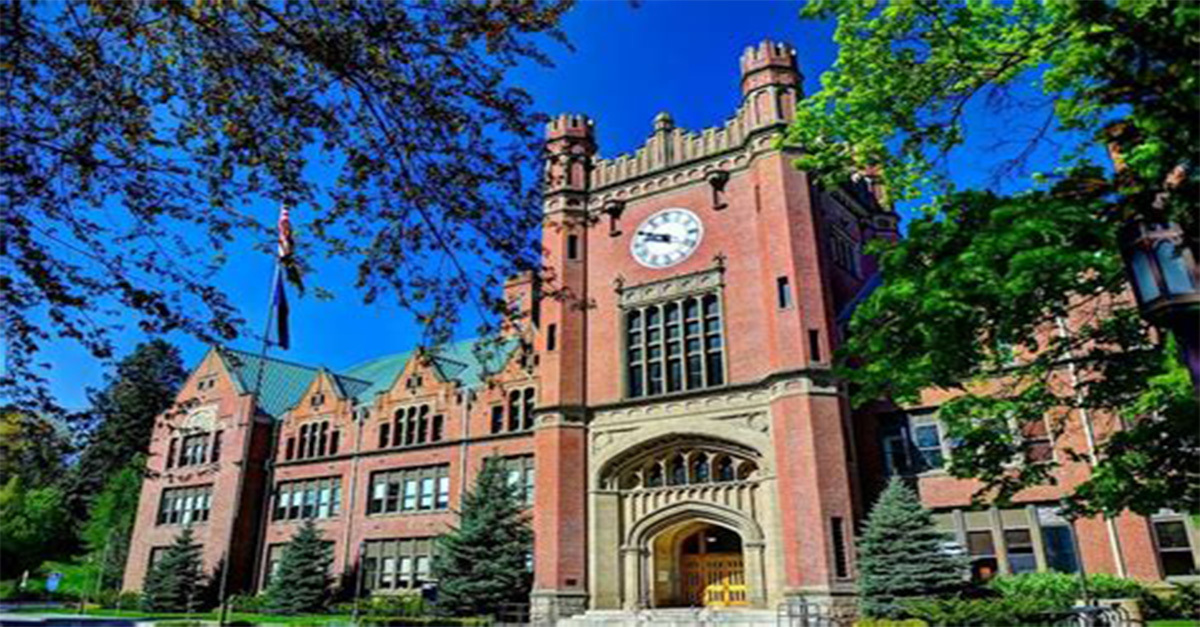


Get a free copy of Parental Rights & Education when you subscribe to our newsletter!

“Some may disagree with Plaintiffs’ religious beliefs. Such is each person’s prerogative and right. But none should disagree that Plaintiffs have a right to express their religious beliefs without fear of retribution. The Constitution makes that clear.”
–David C. Nye
Chief Judge, U.S. District Court of Idaho
In April, the University of Idaho law school held a “moment of community” after an LGBT slur was found on a whiteboard in one of the classrooms. Peter Perlot, Mark Miller, and Ryan Alexander, students at the law school and members of the school’s chapter of the Christian Legal Society (CLS), attended the event where they prayed. The chapter’s faculty advisor, Professor Richard Seamon, was also present.
A female student approached them and asked why the CLS constitution affirms that marriage is between one man and one woman. After a discussion on the matter, they parted.
Perlot later left a note for the female student, known as Jane Doe, saying, “I’m the president of CLS this semester. Feel free to come talk to me if you have anything you need to say or questions you want to ask. I’m usually in my carrel: 6-034. over by the windows. Peter [smiley face].”
Seamon, who taught Doe in some of his classes, sent an email expressing concern that the event may have caused her stress. Doe responded that she was still processing and would visit him during his office hours and thanked him for reaching out.
A few days later, Perlot and Alexander attended an American Bar Association event where Jane Doe allegedly claimed that CLS and its members were bigoted and anti-LGBT. Alexander defended the group and said the only discrimination he had seen was the school’s failure to recognize CLS in a timely manner.
That day, school students staged two walkouts from Seamon’s classes.
Three days later, Perlot, Miller, and Alexander, received no-contact orders from the school, stating that Jane Doe said she felt targeted and unsafe. The no-contact orders barred them from having any contact with Doe and threatened punishment.
Doe never visited Seamon after the email and began attending class online due to health issues. Seamon reached out again weeks later to see if she wanted to speak. The following day Doe emailed Seamon, copying the law school’s dean and associate dean. In it she claimed that the event caused her to fear for her life, she feared Seamon, Seamon and the CLS students had subjected her to verbal abuse, and she threatened to get a restraining order, among other statements. The school then issued a no-contact order against Seamon as well.
The school never informed the students of what the charges were nor did it give them a chance to respond. The students and Seamon filed a lawsuit demanding the school lift the orders.
David C. Nye, chief judge for the United States District Court for the District of Idaho, granted a preliminary injunction, writing, “This case does not appear to present an overly ‘close call.’”
The judge wrote that it seemed the school targeted the CLS members because of the message expressed, noting that those expressing opposing views such as referring to CLS’s views as “beyond the pale” saw no intervention from the school.
The Court wrote:
“The disparity in Defendants’ approach is what bothers the Court most about this case and leans towards a finding that Defendants’ actions were designed to repress specific speech. Jane Doe approached CLS members at the community event on April 1. She asked them a question. And critically, her question was not “what do you believe on this topic,” but “why do you believe the way you do on this topic?” In other words, Jane Doe knew (at least to some degree) what members of CLS believed on the subject of marriage. That she did not agree with the answer Plaintiffs provided is, therefore, not surprising. What is surprising, however, is that Plaintiffs have suffered certain consequences for expressing their personal viewpoints at this event, while Jane Doe has not—even though she expressed opinions contrary to Plaintiffs’ sincerely held religious beliefs. Certainly, there is nothing in the record at this point to suggest that Plaintiffs went to the event to cause disruption or to target certain people.”
The judge ruled that the students and Seamon were likely to succeed on the merit on all counts and ordered the school to lift the no-contact orders.
Matthew Hoffman, legal counsel for Alliance Defending Freedom, which is representing the students, said,
“Peter, Mark, and Ryan are guaranteed the freedom under the First Amendment to discuss their faith on campus, just like every other student and faculty member. Yet the university has unlawfully punished these three students just because it disagrees with their viewpoints. That’s simply not constitutional. We’re pleased they are again free to exercise their constitutionally protected freedoms without fear of punishment, and we look forward to a final resolution of this case in their favor and, ultimately, in favor of free speech for everyone.”
CLS Executive Director and CEO David Nammo also hailed the judge’s take on the case, saying,
“College campuses should be places where free speech is vibrant and the First Amendment is esteemed. CLS is grateful the court acknowledged this today and stood up against a cancel culture threatened by a marketplace of differing ideas.”
The judge’s injunction is just the latest step in this case; the lawsuit will continue to make its way through the court system with the next major step being an actual hearing on the merits of the case.

What is striking about this instance, as with many campus speech cases, is the harmless nature of the speech leading to such a visceral reaction. Jane Doe, who is the one who called out the CLS students and club in a group setting and asked them to explain why they believed the way they believe, then called them bigots, claiming to fear for her life based on their religious views.
What about their words should have been cause for that level of terror? Was it the smiley face note, the genuine concern for her well-being, or the differing viewpoint?
A university is a place of learning, not a place to reinforce everything an individual student believes or a popular, conformist ideology. It is impossible to learn to think or to learn to deal with other people without being exposed to different ideas, different opinions, and different viewpoints. School officials understand this — or at least they should — but instead of standing up for their academic and preparatory mission, they rushed to silence three students who were actually willing to calmly listen, engage, and discuss.
In 2 Timothy 4:3, the Apostle Paul, inspired by the Spirit, told Timothy that “the time will come” when men “will not endure sound doctrine,” but would instead accumulate teachers who would tell them what they wanted to hear. Later, Paul told Timothy to, nonetheless, keep doing the work of an evangelist.
That is still the message to Christians today and it is more relevant than ever: The world hates our message, but nonetheless, we must keep on, always showing love and speaking truth.

Notifications